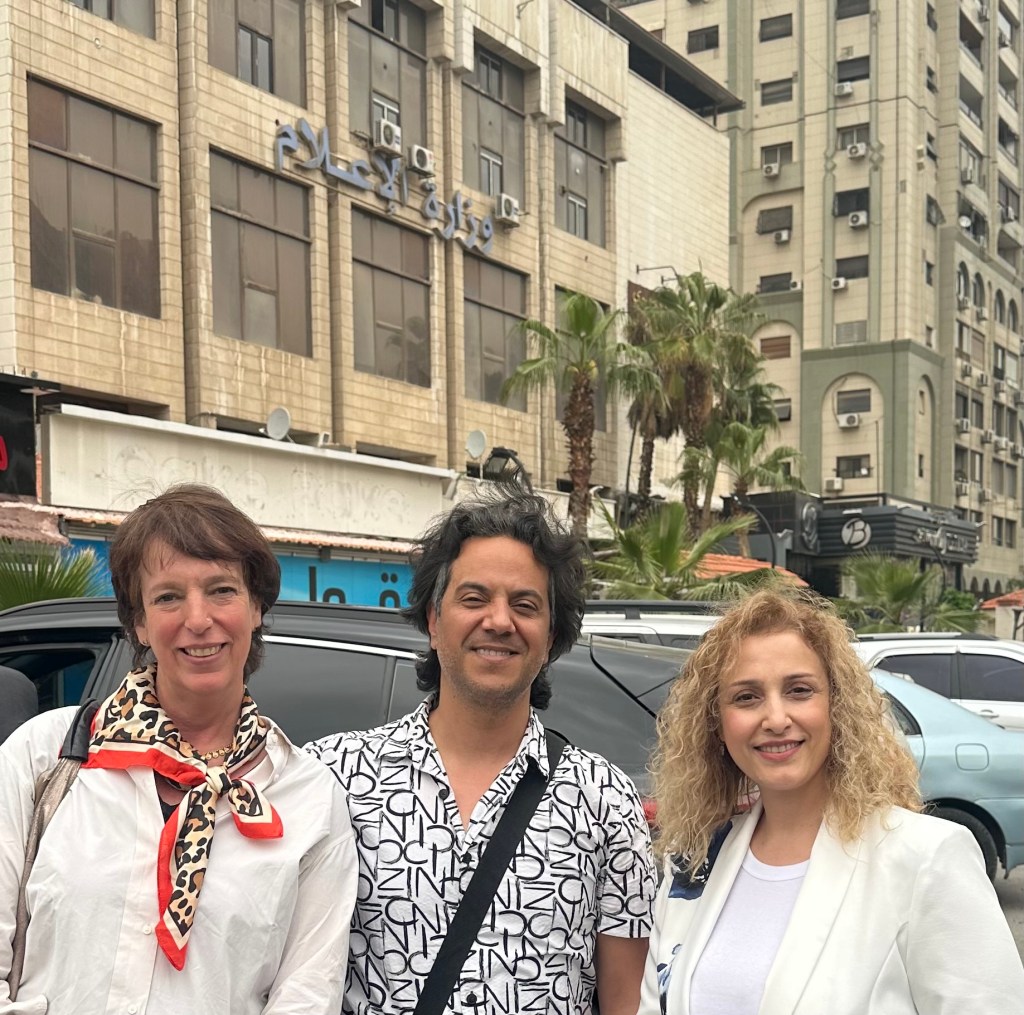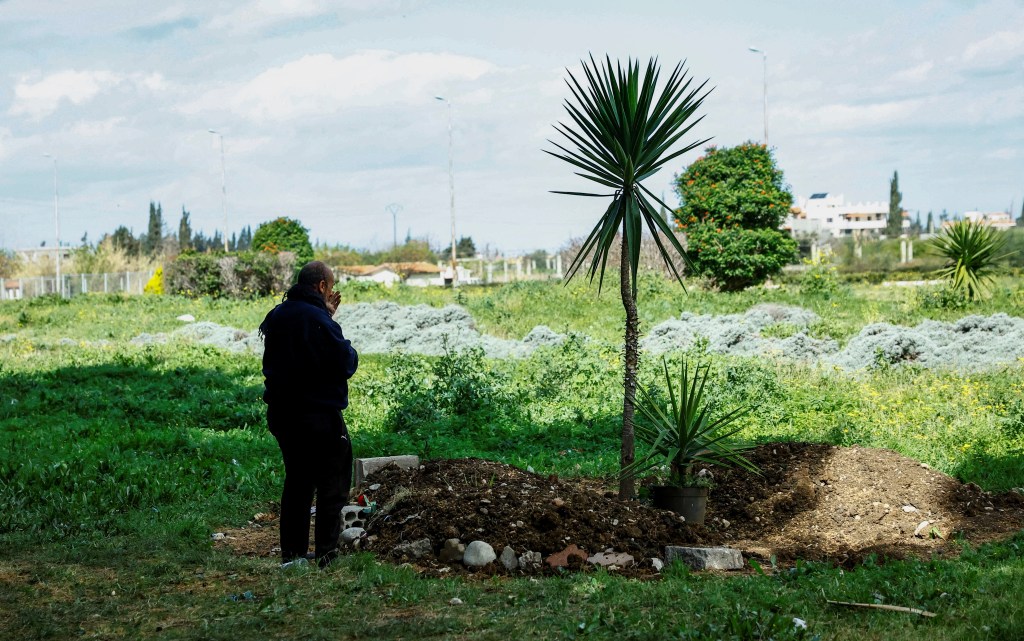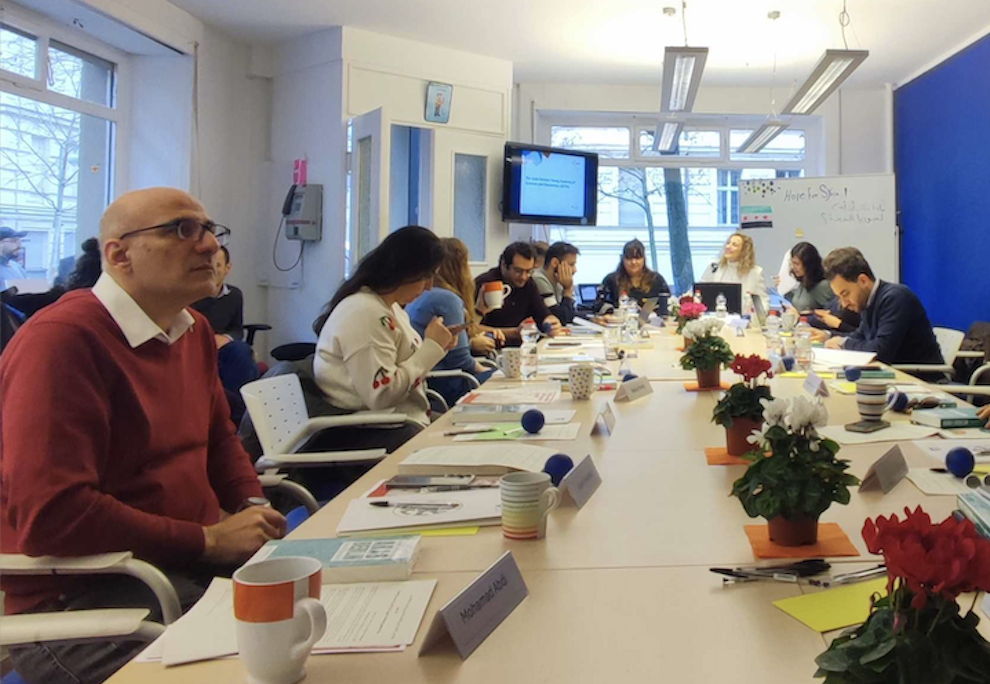Berlin, July 3, 2025—After almost 14 years of civil war, the lightning overthrow of Syria’s President Bashar al-Assad in December has unleashed the possibility of returning home for hundreds of exiled journalists.
For Ahmad Primo, who was arrested by the government for reporting that the 2011 protests were a revolution and then jailed by Islamic State, the idea was tantalizing.
“If I were single, I would go back and join those fighting for the future of Syria,” said Primo, who lives in Norway with his wife and children. “But I have a family and I cannot gamble with their future.”
Primo said his Norwegian passport bars him from returning to Syria, so he will continue working as a researcher for a Norwegian news platform, in addition to running his own Arabic fact-checking platform Verify-Sy.
“It’s not about where we are, it’s about what we’re doing,” he said.

After 54 years of al-Assad family rule, renewed energy has emerged among exiled Syrian journalists to use their skills to support media development and truth-telling back home.
Complex legal and family obligations, security concerns, and sectarian tensions mean permanent return is rarely an option. Some make irregular trips to report and train other journalists, but risk burning their ticket back to Europe without European citizenship.
A few have taken the plunge.
In a Facebook video, Syrian reporter Besher Kanakri stood in front of an airport arrivals sign in Damascus and announced, “I am returning to my homeland after seven years of forced absence.”
After years working for Istanbul-based Syria TV from Germany, he was pleased to be transferred to the Syrian capital.
“Our country needs us and we must go back to contribute to rebuilding it,” Kanakri told CPJ. “The risks are significant but I still want to return.”
Syria has long been among the world’s deadliest countries for journalists with at least 145 killed since 2011, when al-Assad began to crack down on protesters. CPJ is investigating the cases of hundreds of other missing and killed journalists.
Syria topped CPJ’s 2023 Global Impunity Index, which measures where murderers of journalists are most likely to go free.
Tired of being a refugee reporter
Others are staying put, for now.
Journalist Yahya Alaous, 52, arrived in the German capital Berlin, a renowned hub for Arab intelligentsia, a decade ago and found work reporting on refugee life for German outlets.

But he soon got tired of being stereotyped, particularly after 2017, when the anti-immigrant and far-right Alternative for Germany (AfD) rose to prominence as the third-largest party in parliament.
“Every time there was a terrorist attack, I felt I had to defend myself – to explain that we’re not all the same, since many assumed that refugees were the ones coming to Europe and carrying out these attacks,” said Alaous.
“You start to lose patience. I didn’t want to spend my life constantly defending myself for something I had nothing to do with,” he said.
Despite his disillusionment with Berlin, Alaous has prioritized his children’s future and chosen to stay. He mainly writes for Arabic-language media, using contacts back home to report on Syria.
‘Afraid of what might come next’
Security concerns make relocation difficult for many journalists, especially minorities. About 70% of Syrians in the country are Sunni and the remainder are mostly Shia and Ismaili Muslims, Christians, Druze, and Alawites — the community of the al-Assad family.
The new government, Hayat Tahrir al-Sham (HTS), is a Sunni Islamist group with roots in al-Qaeda. HTS has said it supports “Syria for all Syrians” and pledged not to prosecute journalists, but some have reported arrests, assaults, and intimidation in areas like northwest Syria, where the rebels-turned-rulers have been in power since 2017.
Minorities, like Amloud Alamir, are cautious.
“It was an astonishing moment when I woke up and realized the Assad regime had fallen,” said Alamir, who fled to Germany from Syria with her husband after he was imprisoned for his political views.
“I was also afraid of what might come next. I thought there would be chaos, or that radical Islamist militias might take over,” Alamir told CPJ. “We were scared. But we also knew it was a moment to be acknowledged, even if it was too early to celebrate.”

In April, Alamir visited Syria for the first time in 14 years, on a reporting trip. She found a deeply divided country.
“No one sees me as Amloud,” she said, explaining how she was labeled according to her sectarian identity, even though she doesn’t practice the faith. “It’s not easy.”
Despite her deep longing to return, Alamir believes some painful truths cannot be ignored.
“Stay in Damascus if you want to be happy,” she said. “But if you want to see the reality, you have to go elsewhere, like Latakia,” she said, referring to the coastal province where some 1,300 people were massacred in March.
In Latakia’s al-Sanawbar village, where Alawite civilians were executed in revenge killings against al-Assad’s community and buried in mass graves, she found devastation.
“All the women were in black,” she said. “Everyone had lost someone.”
She visited a church where the faithful said they regarded themselves as Syrians first, rather than Christians. While hoping the new government would treat all citizens equally, they also felt hopeless and were quietly looking for ways to leave, Alamir said.

´We didn’t choose to leave´
Divisions between exiles and those who stayed in Syria add further complications.
“We are no longer seen as Syrian journalists by those inside the country,” said Alaous in Berlin. “They believe we didn’t suffer like they did … Some even see us as traitors because we live abroad, while they endured the hardships.”
“But leaving wasn’t our choice, we were forced to flee,” he insisted.
Carola Richter, a communications professor at the Free University of Berlin, believes the development of domestic Syrian media is critical.
“People want transparency about who’s behind the information to decide whether they can trust it,” she said. “Exiled media targeting Syrians is not the ideal solution.”
The fractured nature of exiled media reflects mistrust among Syrians, divided by social and ideological backgrounds, she said, describing a mix of “hope, enthusiasm, fear, and fatigue” among those considering return.
“Many feel disillusioned with journalism in exile, yet unsure if going back would allow them to truly serve their community or put them at risk. This mix of emotions and conflicting thoughts is intense and still needs to be channeled into a clear direction,” she said.
Summer school in Syria

The online outlet Amal Berlin, staffed by a dozen Syrian exiles, plans to harness some of that energy to train young journalists in reporting and fact-checking at a summer school in Syria.
“The fall of the Assad regime created a necessity for Syrians in exile to do something in Syria,” said Julia Gerlach, a German journalist who set up the Arabic-language platform in 2016 to provide practical information to help Syrians settle in Germany.
Another Syrian journalist, who declined to be named, citing fear of reprisals, told CPJ that he went to Damascus in December to work as a fixer for international media and to run free training workshops, hosted by visiting exiles, for “a new generation of journalists.”
“The lucky Syrians were able to flee and have better life and education, and now it’s time for them to give back,” he said, describing it as his duty to improve journalism standards in Syria.
“We have been struggling with propaganda and disinformation during war and it’s always been hard to get verified news … I’m trying to transfer what I’ve learned from the last decade working with international media outlets to my people,” he said.
“I would love to travel around Syria and give workshops nonstop. It means a lot to me to give to anyone, so imagine how it feels when it’s my people who are receiving.”
This content originally appeared on Committee to Protect Journalists and was authored by Lamiya Adilgizi.